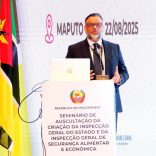Authorities urge importers to present mandatory Certificate of Conformity for products destined for ...
More on US financial regulator SEC investigating Ematum bond – AIM report

File photo / Ematum boats docked in Maputo
The US financial regulator, the Securities and Exchange Commission (SEC) is investigating the sale of the bonds for 850 million US dollars issued for the Mozambique Tuna Company (Ematum) by three European banks – Credit Suisse, BNP Paribas of France and VTB of Russia.
According to a report carried by the “Wall Street Journal” (WSJ) on Wednesday, the interest shown by the SEC “inserts the U.S. into a widening global investigation of Mozambique’s debt deals, which involved undisclosed loans and military purchases facilitated by the banks”.
Last month the SEC “sent letters to bondholders asking them for documents provided by Credit Suisse, VTB and BNP Paribas during the sale of the bonds”, according to the WSJ which has obtained a copy of the letter. The letter, the paper added, “also requested investors turn over all communications to and from the banks related to the bonds”.
When the Ematum bonds were sold in 2013, their ostensible purpose was to finance the purchase of 24 fishing boats (21 longliners and three trawlers), and six “Interceptor” patrol vessels. The boats were built at the Constructions Mechaniques de Normandie (CMN) shipyard, in the French port of Cherbourg, which is owned by the company Abu Dhabi Mar.
According to Ematum itself, of the 850 million dollars, about 14 million dollars was absorbed by bank fees, and the other 836 million was sent to Abu Dhabi Mar.
Yet there is no way that the 30 boats could have cost 836 million dollars. According to the website of the Ministry of the Sea, Inland Waters and Fisheries, a longliner purchased in Europe costs between two and six million dollars, while a trawler costs between 15 and 18 million dollars. The 24 fishing boats should thus have cost a maximum of 240 million dollars, leaving 596 million dollars unaccounted for.
It is quite impossible that this sum could have been spent on six small patrol boats. Besides, the French financial press in 2013 put the cost of all 30 vessels at 200 million euros (about 230 million dollars at the exchange rate of the time).
When, in December 2013, the EMATUM loan was inserted into the Mozambican state budget, most of it (500 million dollars) was allocated to the Ministry of Defence, and only 350 million dollars to the fishing assets.
It was thus assumed that most of the money had gone towards military equipment (in addition to the six patrol boats). This suspicion was strengthened with the discovery that Ematum was just one of three security linked companies, which were set up for security in the Mozambique Channel, under a “Project for Monitoring and Protection of the Exclusive Economic Zone”.
The Project has never been published. It was deemed necessary because of threats of maritime piracy, illegal immigration, terrorism, drug trafficking, illegal fishing, and the need to guarantee security for oil and gas exploration.
The other two companies, Proindicus and MAM (Mozambique Asset Management), were kept secret but took out government-guaranteed loans totaling over 1.1 billion dollars from Credit Suisse and VTB. The guarantees for Ematum, Proindicus and MAM added 20 per cent to Mozambique’s total foreign debt, and pushed it over the threshold of unsustainability.
The loans had not been disclosed, either to the Mozambican public, or to Mozambique’s foreign partners, notably the International Monetary Fund (IMF). In April this year, the IMF reacted by suspending its programme with Mozambique, and most of the country’s other western partners followed suit.
The Commission of Inquiry set up by the Mozambican parliament, the Assembly of the Republic, to investigate Ematum, Proindicus and MAM, was unable to find out exactly what the two billion dollars lent to the three companies had been spent on. No full list of assets has ever been published – the commission could only recommend that this work be continued, as well as an investigation into “any signs of illicit use of public funds by private individuals or companies during the contracting of the debts and issuing of guarantees”.
The Commission was highly critical of some of the procedures used. Apparently the money lent to all three companies was transferred in total to the contractor (Abu Dhabi Mar). Transferring all the money “ignored the needs for management funds, staff hiring and training costs, apart from the opportunity costs of time linked to bureaucratic procedures (licensing, recruitment etc) which should have weighed in assessing the period for debt repayment, and hence in the overall analysis of the capital cost”, the report from the Commission said.
The report also found the relations between the three companies, the contractor and the creditors (the banks) were far too close. These relations “were not transparent”, and the government ought to have brought in an independent inspecting body to check whether the assets ordered by Ematum, Proindicus and MAM had indeed been delivered.
The SEC intervention follows announcements earlier in the year that the British and Swiss regulators intended to investigate the role of the banks (Britain is involved because the loans were handled by the London branches of Credit Suisse and VTB).
An independent international audit of Ematum, Proindicus and MAM is now under way. Although this is headed by the Mozambican Attorney-General’s Office, the key player is the US company Kroll, which has a reputation as the foremost forensic auditor in the world.
The audit is expected to be completed by the end of February, and the government has promised to make its conclusions public.












Leave a Reply
Be the First to Comment!
You must be logged in to post a comment.
You must be logged in to post a comment.